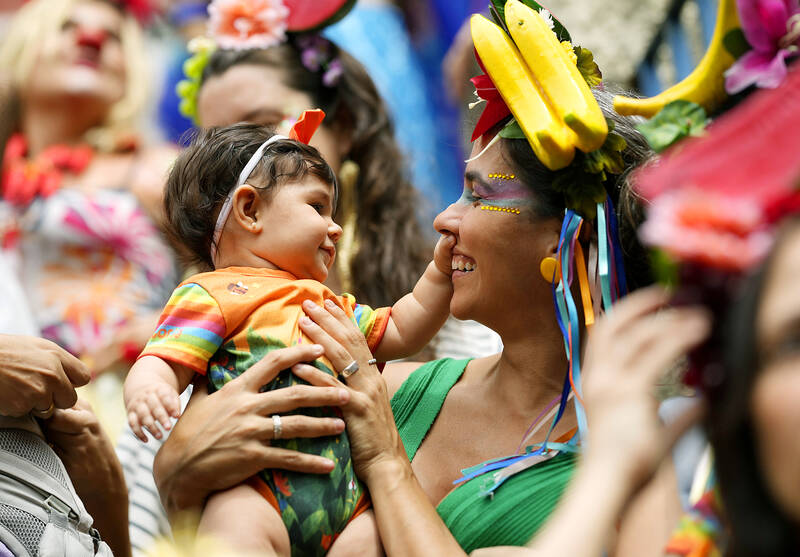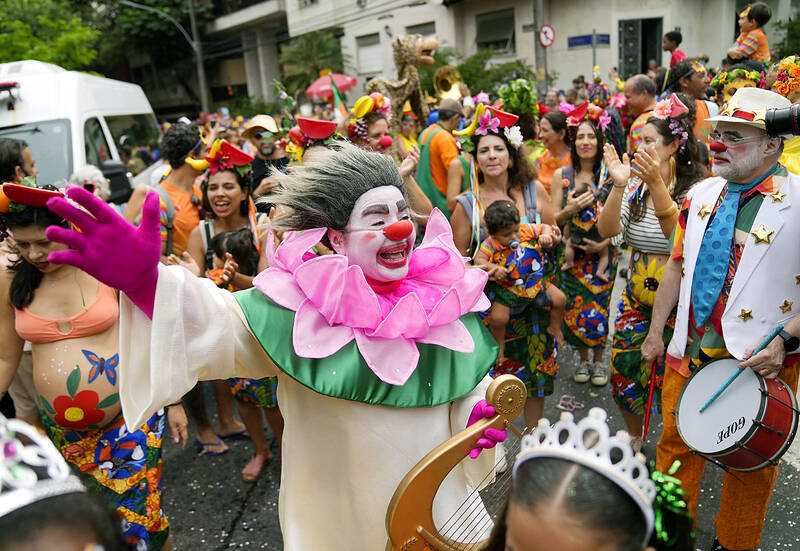Covered in golden glitter, Brazilian domestic worker Vera Lucia da Silva is bursting to be back parading through Rio de Janeiro in a carnival street party after a three-year hiatus amid COVID-19 restrictions.
This year marks the full comeback of the world’s biggest carnival, after Rio last year hosted a watered-down version that was postponed by two months because of the pandemic, and held without the epic street parties known as blocos that usually swarm the iconic beach city at this time of year.
“To people from Rio, street carnival is everything that’s good in life,” said Da Silva as she paraded through the hillside neighborhood of Santa Teresa in a bloco known as Ceu na Terra — “Heaven on Earth.”

Photo: AP
It was just after sunrise on a Saturday morning, but the beer was already flowing as revelers bounced to the beats of the bloco’s brass band, decked out in sequins, body paint, sparkly hot pants and masks — the costume-ball kind.
“Street carnival brings together people from all walks of life — everyone playing, everyone happy,” said Da Silva, 58, who plays a traditional percussion instrument known as the ganza in the bloco band.
Rio authorized about 400 blocos this year. They have been flooding the streets ahead of the main carnival event — the city’s samba school parade competition, scheduled for Sunday and Monday nights.

Photo: AP
Some revelers are also celebrating because it is the first carnival since the election loss of former Brazilian president Jair Bolsonaro, whose critics accuse him of attacking causes close to the carnival community’s heart.
Some revelers poked fun at the former army captain, whose slogan was: “Brazil above all, God above everyone.”
“We’re for ‘carnival atop all, booze inside everyone,’” said 44-year-old teacher Amelia Crespo, who was sporting the Brazil soccer team’s yellow jersey.
“This is a moment of rebirth,” said Pericles Monteiro, a founder of Ceu na Terra and conductor of its 200-member band.
“We went through a very dark period, in terms of both politics and the pandemic,” Monteiro told reporters.
“We were feeling suffocated on every level, as a cultural group, as citizens, as people dealing with a health crisis that caused so many deaths,” he said.
“Brazil is emerging from a period in which political power was anti-carnival,” said Adair Rocha, head of cultural programming at Rio de Janeiro State University. “This year’s carnival is all about happiness, the re-embrace of democracy, the freedom to celebrate cultural and sexual diversity... Carnival is all about democratic expression, the celebration of life.”
Brazilian President Luiz Inacio Lula da Silva, who narrowly beat Bolsonaro in the election in October last year, met with samba school leaders during the campaign and might attend the official carnival parades this year, media reports said.
Brazilian first lady Rosangela “Janja” da Silva has already signed up to be “godmother” at the Imperatriz samba school and support its social projects in Rio’s slums.
There is an optimistic vibe in the air at “Samba City,” the sprawling hangars where the samba schools prepare the towering floats and sumptuous costumes for their world-famous shows at the city’s Sambadrome parade venue.
“You can feel it: Culture is valued again,” said Tarcisio Zanon, creative director at the Viradouro samba school. “This is going to be a carnival of redemption, of hope for a better future.”
Rio officials are expecting 5 million people to take part in street carnival, moving an estimated 1 billion reais (US$190 million) for the local economy.
In the Saara market district, Rio’s mecca for sequins, wigs, glittery get-ups and all other things carnival, street vendors and shopkeepers are ready for the comeback.
“People have years of pent-up carnival energy,” vendor Marcelo Rodrigues said. “They’re ready to party.”

People with missing teeth might be able to grow new ones, said Japanese dentists, who are testing a pioneering drug they hope will offer an alternative to dentures and implants. Unlike reptiles and fish, which usually replace their fangs on a regular basis, it is widely accepted that humans and most other mammals only grow two sets of teeth. However, hidden underneath our gums are the dormant buds of a third generation, said Katsu Takahashi, head of oral surgery at the Medical Research Institute Kitano Hospital in Osaka, Japan. His team launched clinical trials at Kyoto University Hospital in October, administering an experimental

Ukraine’s military intelligence agency and the Pentagon on Monday said that some North Korean troops have been killed during combat against Ukrainian forces in Russia’s Kursk border region. Those are the first reported casualties since the US and Ukraine announced that North Korea had sent 10,000 to 12,000 troops to Russia to help it in the almost three-year war. Ukraine’s military intelligence agency said that about 30 North Korean troops were killed or wounded during a battle with the Ukrainian army at the weekend. The casualties occurred around three villages in Kursk, where Russia has for four months been trying to quash a

ROYAL TARGET: After Prince Andrew lost much of his income due to his friendship with Jeffrey Epstein, he became vulnerable to foreign agents, an author said British lawmakers failed to act on advice to tighten security laws that could have prevented an alleged Chinese spy from targeting Britain’s Prince Andrew, a former attorney general has said. Dominic Grieve, a former lawmaker who chaired the British Parliament’s Intelligence and Security Committee (ISC) until 2019, said ministers were advised five years ago to introduce laws to criminalize foreign agents, but failed to do so. Similar laws exist in the US and Australia. “We remain without an important weapon in our armory,” Grieve said. “We asked for [this law] in the context of the Russia inquiry report” — which accused the government

FREEDOM NO MORE: Today, protests in Macau are just a memory after Beijing launched measures over the past few years that chilled free speech A decade ago, the elegant cobblestone streets of Macau’s Tap Seac Square were jam-packed with people clamouring for change and government accountability — the high-water mark for the former Portuguese colony’s political awakening. Now as Macau prepares to mark the 25th anniversary of its handover to China tomorrow, the territory’s democracy movement is all but over and the protests of 2014 no more than a memory. “Macau’s civil society is relatively docile and obedient, that’s the truth,” said Au Kam-san (歐錦新), 67, a schoolteacher who became one of Macau’s longest-serving pro-democracy legislators. “But if that were totally true, we wouldn’t